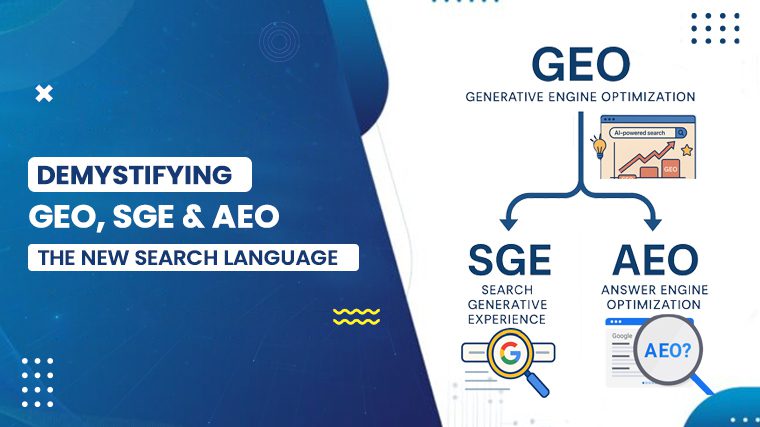
For businesses that are interested in keeping their heads above the water in keeping an online presence, being aware of the ever-changing trends of search engines in this cutting-edge world of digital marketing would matter most to them. As one of the top digital marketing agencies in the USA, we have been witness to more seismic changes in how search engines deliver results. The emergence of artificial intelligence (AI) has brought about new terminologies like Generative Engine Optimization (GEO), Search Generative Experience (SGE), and Answer Engine Optimization (AEO). The terms are indicative of the future of search and are turning conventional Search Engine Optimization (SEO) strategies on their heads. This blog demystifies those terms and considers how the power of AI is transforming the digital marketing landscape.
The Transition in Search – From SEO to AI-based Strategies
Traditional SEO has long been the backbone of digital marketing services in the USA, primarily concerned with optimizing websites to be crawled and ranked high on search engine results pages (SERPs). It uses the way of keyword research, backlink building, and on-page optimization to get clicks and traffic. However, direct, short answers have emerged from the traditional link-based results as AI powers set standards for search engines. The shift led to the concepts of GEO, SGE, and AEO that cater to the needs of modern search technologies.
AI-powered search engines like Google’s SGE and Microsoft’s Copilot have made it 60% of users’ intentions not to rely on original SERPs. This change encompasses transformation and urges businesses to keep present in an AI landscape.
What is GEO (Generative Engine Optimization)?
Generative Engine Optimization (GEO) means optimizing content for artificially intelligent search engines that generate responses after synthesizing information from multiple sources. In contrast to simple website ranking, the purpose of GEO lies in ensuring that the content used gets cited in AI-generated answers on channels like Google’s SGE, Bing Chat, or ChatGPT.
What is meant by Search Generative Experiences, SGE?
One example of how really AI is remixing the SEO space is through Google’s Search Generative Experience. Summaries from across several sources use generative AI to summarize the SERP for the user and give concise answers, mostly in a unitary response. Stand-alone websites that could be accessed through clicking become lesser, which brings out the zero-click visibility.
For businesses, SGE is reshaping SEO means changing the way marketers create their content strategies. Henceforth, it is no longer about how much a brand pages for a particular keyword or category. Instead, marketers should be generating content that an AI can interpret and summarize effortlessly. This includes clear headings and bullet lists. Most importantly, the use of structured data such as FAQ schemas. For example, a digital marketing agency in the USA might optimize a blog post with question-based headers like “How can AI improve PPC campaigns?” to range with SGE’s preference.
AEO (Answer Engine Optimization): Now Trending Towards Zero Click Searches
A content focus on AI answer engines such as featured snippets, voice search response tools, and knowledge panels will give way to Answer Engine Optimization (AEO). Thanks to voice assistants like Siri and Alexa, zero-click searches now make AEO quite significant as regards visibility capture.
As shown below, core pages and articles dominate AI-driven traffic, highlighting the importance of building structured, authoritative pages to gain visibility in SGE results.
 Why These Strategies Matter in Digital Marketing?
Why These Strategies Matter in Digital Marketing?
In fact, GEO, SGE, and AEO have now become mandatory elements of digital marketing strategies. The direct informing-or answering created content and synthesized content in AI-driven search engines point to visibility loss for businesses that do not adapt. According to Fruitbowl Digital, the combination of these with traditional SEO constitutes a holistic approach to maximizing reach across both traditional and AI-powered platforms.
Such modern changes can be seen in the digital marketing services offered in the USA. Agencies now use AI-enabled tools to understand the user intent, optimizing voice search and tracking performance in the AI-generated search results. One example is HubSpot’s AI Search Grader, a tool that will measure how well content does in AI-powered searches, offering actionable insights that can be used to boost GEO and AEO.
Conclusion: The Future has Arrived
The arrival of GEO, SGE, and AEO marks a new digital marketing paradigm where artificial intelligence is adjusting how businesses relate with their audiences. Unlike traditional SEO, these strategies carry a new understanding, which seeks to provide direct answers, accessible and credible, that AI-powered platforms will prioritize. Integration is key to remaining on top of this trend. It has much to do with e intelligence – the ability to create smarter and more efficient digital marketing strategies through harnessing insights from AI. Start now, and optimize for GEO, SGE, and AEO. You are future-proofing your online presence.
Decode AI Search Trends
GEO, SGE, AEO: all these aren’t just buzzwords. Learn how the new AI-powered search language is changing how content gets found, ranked, and clicked.




